Hong Kong protests explained in 100 and 500 words
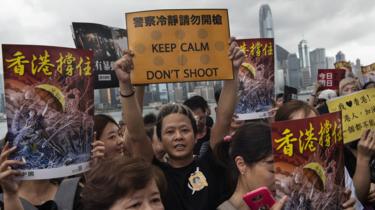 Getty Images
Getty Images Hong Kong has been rocked by anti-government protests for months and the situation shows no sign of dying down.
To bring you up to date, here's all the background you need to know in 100 or 500 words - you can read each individually or in turn.

The Hong Kong protests started in June against proposals to allow extradition to mainland China.
Critics said this would undermine the city's judicial independence and could put dissidents at risk.
A former British colony, Hong Kong has some autonomy and more rights than the mainland under a "one country, two systems" deal.
Despite city leader Carrie Lam agreeing to indefinitely delay the bill, demonstrations continued and developed to include demands for full democracy and an inquiry into police actions.
Clashes between police and activists have been become increasingly violent with police using tear gas and activists storming the parliament building.

The extradition bill which triggered the first protest was introduced in April. It would have allowed for criminal suspects to be extradited to mainland China, under certain circumstances.
Opponents said this risked exposing Hong Kongers to unfair trials and violent treatment. They also argued the bill would give China more greater influence over Hong Kong and could be used to target activists and journalists.
Hundreds of thousands of people took to the streets. After weeks of protests, leader Carrie Lam eventually said the bill would be suspended indefinitely until it expired.
How did the protests escalate?
Protesters feared the bill could be revived, so demonstrations continued, calling for it to be withdrawn completely.
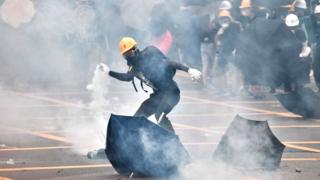 AFP
AFP Over the weeks, clashes between police and protesters have become more frequent and more violent, with injuries on both sides and scores of people arrested.
Police have fired tear gas and rubber bullets while some activists have thrown bricks, firebombs and other objects.
In July, groups of protesters stormed the parliament building defacing parts of it. Also in July, a masked mob armed with sticks attacked people returning home from a protest inside Yuen Long station, far from the city centre.
In August, one protester was injured in the eye, leading to demonstrators wearing red-coloured eye patches to show their solidarity.
Protest action at Hong Kong international airport in August also saw renewed clashes and led to hundreds of flights being cancelled.
What do the protesters want?
The protesters' demands have changed throughout the weeks of demonstrations and they are now calling for:
- Complete withdrawal of the extradition bill
- Withdrawal of the "riot" description used about the protests
- Amnesty for all arrested protesters
- An independent inquiry into alleged police brutality
- Universal suffrage for the elections of the Chief Executive and Legislative Council, Hong Kong's parliament.
Some also want the resignation of Carrie Lam, who they view as a puppet of Beijing.
After initially staying quiet on the unrest, China has condemned the Hong Kong protests as "behaviour that is close to terrorism" - a sign its rhetoric is hardening.
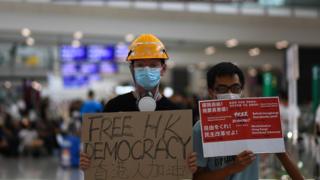 AFP
AFP There have also been reports of Chinese police and military massing across the border in Shenzhen, in a clear show of force.
Protests supporting the Hong Kong movement have spread across the globe, with rallies taking place in the UK, France, US, Canada and Australia.
In many cases, people supporting the Hong Kong demonstrators were confronted by pro-Beijing rallies.
What is Hong Kong's status?
Hong Kong is a former British colony but was handed back to China in 1997.
It is run under a "one country, two systems" agreement that guarantees it a level of autonomy.
It has its own judiciary and a separate legal system from mainland China. Those rights including freedom of assembly and freedom of speech are protected.
But those freedoms - the Basic Law - expire in 2047 and it is not clear what Hong Kong's status will then be.
Want to know more?
Read this:
Watch this:
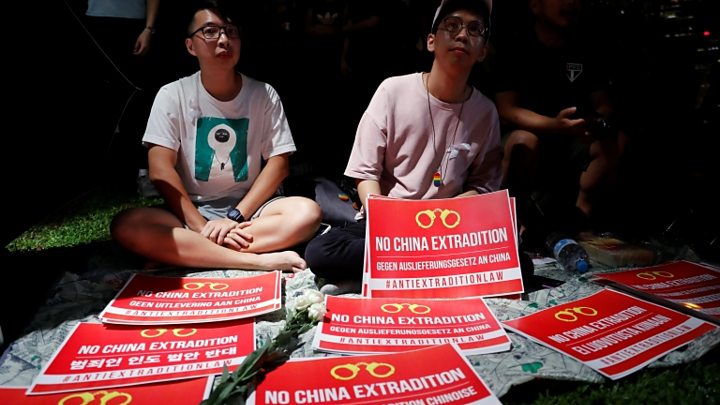

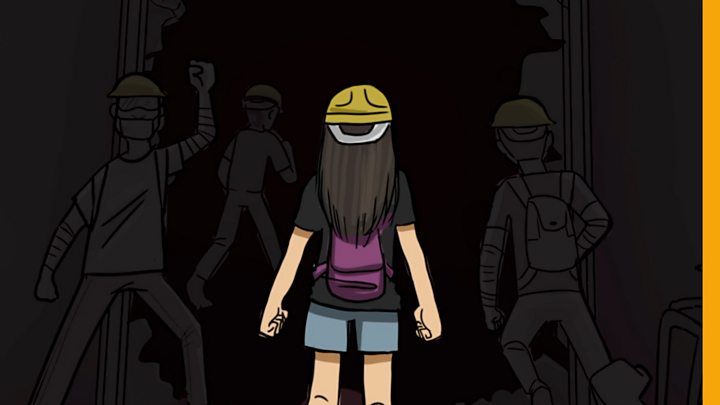
No comments:
Post a Comment